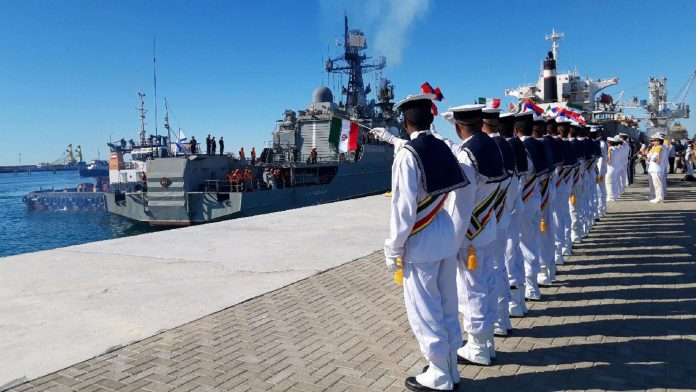
China, Russia and Iran launched joint naval exercises in the Gulf of Oman on Wednesday, as rival power the United States hosts the Middle East’s largest maritime drills nearby.
‘Security Bond-2023’ drills from Wednesday based on similar three-way manoeuvres in 2019 and 2022, Chinese defence ministry says
The US is hosting the Middle East’s largest maritime drills in the region, an 18-day event involving 50 countries and international agencies
The joint naval manoeuvres with Iran and Russia will run until Sunday, China’s Ministry of Defence said, adding they will help “deepen practical cooperation among the navies of participating countries”.
Officially named “Security Bond-2023”, the exercise has been developed from similar training carried out by the three countries in 2019 and 2022, and will include “aerial search operations, sea rescue [and] fleet formation exercises, as well as other tasks”, the ministry statement said.
The statement also said other countries are involved but did not give details.
The Security Bond drills coincide with the last leg of the 18-day International Maritime Exercise 2023, which kicked off on March 2 at the US 5th Fleet’s headquarters in Bahrain.
The eighth edition of the US-led event since it was set up in 2012 involves 50 countries and international agencies – including France, Pakistan, Egypt, Saudi Arabia, Nato and Interpol.
“[The Security Bond exercise] will help demonstrate the will and capability [of the participating countries] to jointly safeguard maritime security and actively build a community of shared future for the sea, and inject positive energy into regional peace and stability,” the statement from Beijing said.
China has sent its South Sea Fleet warship the Nanning to take part in the drills. The type 052D destroyer has been dubbed the “Chinese Aegis” as it is benchmarked against the US Navy’s Arleigh Burke-class Aegis destroyers.
The 7,500-tonne Nanning is equipped with advanced integrated radar, and a 64-cell vertical launch system for a variety of air defence, land attack, anti-ship and anti-submarine missiles.
In January, the Nanning was dispatched to missions in the Indian Ocean, and then participated in the Pakistan-led multinational Arabian Sea naval exercise AMAN-23 and the International Defence Exhibition in Abu Dhabi last month.
According to a US Navy statement, this year’s IMX involves 7,000 personnel, 35 ships, and 30 unmanned and artificial intelligence systems from the participating nations and international bodies. The exercise spans the Arabian Sea, Gulf of Oman, Gulf of Aden, Red Sea, Indian Ocean and East African coastal regions, and is expected to wind up by March 20.
The Gulf of Oman in the northwestern Indian Ocean is a key transit point for international energy shipments, connecting the Arabian Sea to the Strait of Hormuz leading to major oil producing nations including Iran and Saudi Arabia.
The Gulf of Oman in the northwestern Indian Ocean is a key transit point for international energy shipments, connecting the Arabian Sea to the Strait of Hormuz, which leads to major oil producing nations including Iran and Saudi Arabia.
China, Russia and Iran each have various degrees of tension with the US. Beijing, meanwhile has expanded its influence and presence in the Middle East in recent years as it presents itself as a global leadership alternative to Washington.
Last week, it brokered a surprise deal for long-time rivals Iran and Saudi Arabia to resume diplomatic ties after seven years, raising hopes of a lasting peace in the Middle East and highlighting China’s role as a global mediator.
Beijing is also a close partner of Moscow, and has been criticised by the US and its allies for refusing to condemn the Russian invasion of Ukraine.
China has said it will keep pushing for peace talks and President Xi Jinping is expected to visit Russia in the coming weeks.












